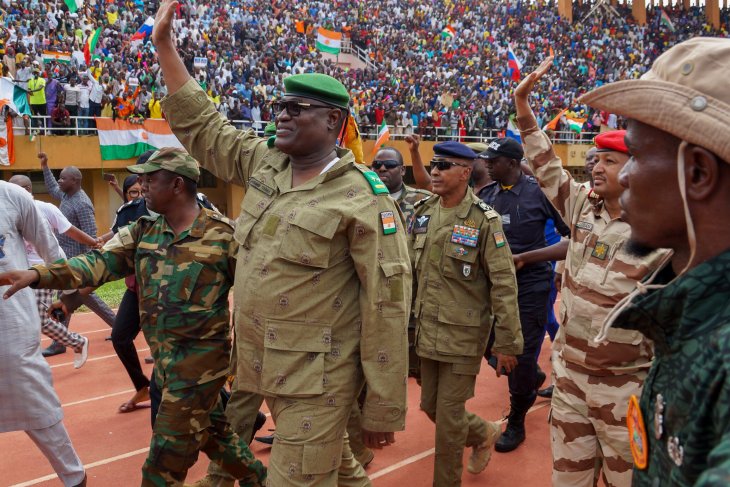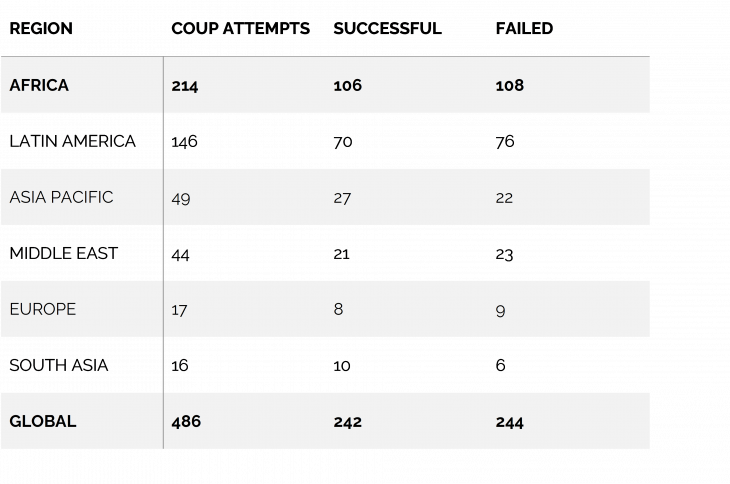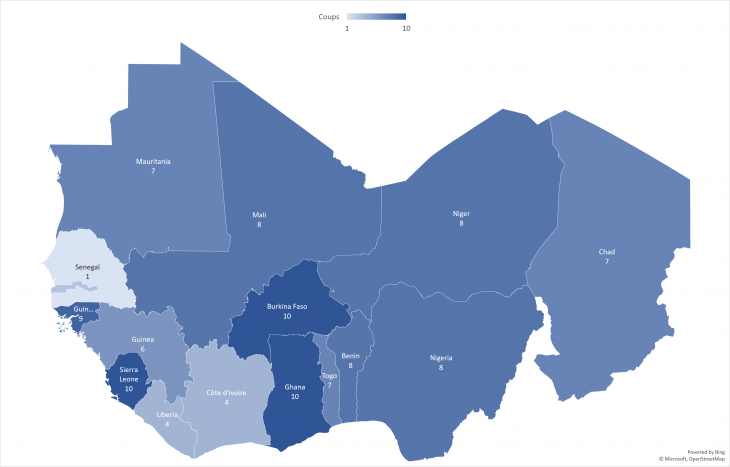In a 2021 op-ed, we predicted that military coups and political unrest in West African countries like Guinea, Mali, and Burkina Faso signaled a recurring pattern of semi-democratic military rule. Recent military takeovers in Niger on July 26 and Gabon on August 30 have now affirmed this prediction.

Mohamed Toumba, one of the leading figures of the National Council for the Protection of the Fatherland, attends the demonstration of coup supporters and greets them at a stadium in the capital city of Niger, Niamey on August 6, 2023. Photo: Balima Boureima/Anadolu Agency via Getty Images
This raises a crucial question: are we witnessing the emergence of a new brand of political leadership in Africa, starting within the Economic Community of West African States (ECOWAS) region?
Decline of Western Democracy vs Rise of Authoritarian Regime
As of today, September 3, the fate of Gabon’s deposed President Ali Bongo Ondimba and Niger’s former President Mohamed Bazoum remains unclear following the military coups.
However, what seems certain is that the ongoing political developments underscore a troubling trend, not only of military coups but also authoritarian regimes gaining ground at the expense of declining semi-democratic systems that have prevailed in this resource-rich yet politically tumultuous continent since the Cold War era.
Just to demonstrate, countries such as Mali and Guinea scored 29 and 30 out of 100, respectively, on Freedom House’s Global Freedom Index. To understand this disquieting trend, we must explore two key driving forces: socio-political and socio-economic factors in the surge of military coups in Francophone West Africa.
In the following sections, we delve into the case of Niger, the latest Sahelian state to face political turmoil after Mali and Burkina Faso, while focusing on these driving factors.
Overview over Global Coups by Region 1950-Present

Source: Data from Jonathan Powell (University of Central Florida) and Clayton Thyne (University of Kentucky).
The Case of West Africa and Niger
The recent coup in Niger, mirroring past military takeovers, saw a faction of the security forces, identifying themselves as the National Council for the Safeguarding of the Homeland (CNSP), seize power through a televised announcement.
While some attribute the coup to domestic issues like economic underdevelopment and security challenges, it’s crucial to acknowledge the growing anti-French sentiments among African youth. Niger, despite its vast territory of 1,270,000 square kilometers and a population of around 25 million, has remained under French influence since gaining independence from France in 1958.
Paradoxically, despite its abundance of natural resources like oil and uranium, Niger stands as one of the poorest African nations, with “42.9% of Nigeriens living in poverty, earning less than $1.90 per day”. This paradox can be partly explained by France’s uneven exploitation of uranium to fuel its nuclear power plants.
The Russia-Ukraine conflict, resulting in restrictions on certain Russian oil and gas, has emphasized Niger’s crucial role as a uranium supplier to the EU and its member states. Controlling the world’s seventh-largest uranium deposit, Niger became the second-largest exporter of natural uranium to the EU in 2022, primarily supplying France (50%) and other EU nations (24%), contributing to a quarter of their electricity production.
Nevertheless, Niger has one of the lowest rates of electricity access. A United States Agency for International Development (USAID) report revealed that only one out of seven Nigeriens has access to electricity, with less than five percent of rural populations enjoying this service. Furthermore, Niger plays a pivotal strategic role for the EU, especially France and the U.S., as an African partner in their military operations, encompassing counter-terrorism efforts in the Sahel and the control of influx of economic migrants from other African countries.
Security Implications of this Trend on Regional Stability: the Role of ECOWAS
With the expansion of its primary role as a regional economic group, ECOWAS has embarked on the path of managing and preventing conflict in West Africa. There have been blueprints of success stories in this new role; however, the current case of Niger lacks a clear road map due poor leadership and a deficit of democratic style of governance in the region.
ECOWAS is currently in security limbo in the case of Niger due to multiple external and internal factors which have now undermined the credibility of its mandate and power to launch this operation.
(a) In its role as peace and security actor, ECOWAS is described by many regional analysts as an intergovernmental organization which lacks a clear mandate to invade or operate a military campaign in any regional sovereign nation without a resolution from the UN Security Council. Analysts and scholars who ascribe to this opinion view Russia as a potential factor which could veto any resolution from the Council.
(b) Another potential challenge faced by ECOWAS is the funding dimension of a military campaign in Niger. ECOWAS lacks the funding and will have to seek support from international partners like the EU led by France. Most importantly, the military operation in Niger could be costly due to many factors including the geographic nature and landscape of Niger.
(c) Most of the regional leaders signing off or spearheading the military invasion in Niger are old, elite, corrupt and unpopular third term leaders such as Alassane Ouattara of Ivory Coast.
(d) Finally, the unpopularity attached to former colonial powers, mainly France, has added grassroots uprisings in the region against ECOWAS’ economic sanction or military invasion of Niger. In fact, many regional observers think ECOWAS is fighting a proxy war on behalf of France in the case of Niger. France is also regarded by many young African intellects as the ‘puppet master’ who continuously undermines economic progress and development in the region.
Numbers of Coups in ECOWAS Member States 1952-2023

Source: Data from Jonathan Powell (University of Central Florida) and Clayton Thyne (University of Kentucky).
Rethinking New Regional Political Space and Leadership
The evolving socio-political and economic conditions in Africa, particularly in the western region, are leading to a reconfiguration of political power dynamics and, fundamentally, a redefinition of leadership.
To better understand and analyze this ongoing political transformation in West Africa, historical perspectives must be incorporated. Essentially, we are witnessing a recurrence of history. The socio-political crises currently shaking Francophone Africa are the outcomes of over six decades of French “France-Afrique” policy in this part of the continent.
This one-sided policy has favored France while neglecting African states’ needs. Over time, this French policy has become an inescapable, ever-present, and all-powerful system in the African political sphere, with a significant portion of African elites complicit in its perpetuation. While France has historically played a central role in these configurations, we are now witnessing a radical change driven by external factors like demographic shifts, the rise of the digital revolution, and environmental concerns. This transformation is radical because it involves the emergence of new actors and the exclusion of certain historical actors from the equation.
The evolution of the political sphere in Francophone Africa since independence can be divided into four periods, each transforming the regional political landscape and introducing a new vision of leadership:
1950s-1970s: Authoritarian Sovereignties – The early independence leaders were predominantly patriotic but less formalized and politicized compared to the current generation. They had limited access to information.
1970s-2000s: Liberal-Militaries – The 1970s witnessed a surge in military coups aimed at neutralizing sovereigntist movements in favor of Western powers, particularly France. This marked the zenith of “France-Afrique” politics. These new leaders were often poorly educated and politically disengaged military figures who established dictatorships with the support of Western states like France and the U.S. These regimes were plagued by endemic corruption, and policies such as Structural Adjustment Programs, privatization, and the dismantling of post-independence states were adopted to maintain the status quo, favoring the elites and their cronies.
2000s-2020: Liberal-Democrats – Democratization gained momentum due to globalization and the protection of foreign interests in Africa. This period witnessed the rise of socio-liberal intellectuals aligned with the West, advocating for democratic principles. These leaders, often well-educated, had experienced the period of independence and contributed largely to consolidation of the “France-Afrique” intellectual network, albeit with an appearance of being subdued and corrupt.
2020-Present: Neo-Sovereigntist Militaries – A new wave of military coups has emerged, driven by a highly politicized youth eager for change. This generation is the best-educated and most politically engaged in the modern political history of this region. Inspired by Pan-African ideologies and figures like Thomas Sankara, many of these new leaders espouse anti-French sentiments. These sentiments are fueled further by the long-term and adverse political, economic, and social consequences of the France-Afrique policies adopted since the 1950s and 60s.
The End of “La Politique France-Afrique”?
While France has historically played a central role in African politics through its networks, a new phase is unfolding where the repercussions of decades of French policy allow a new generation of leaders to distance themselves from France. This strategy is effective because showing displeasure towards French policy has become a valid rationale for justifying coups in Africa, much like it was in the 1970s. However, this time, the neo-sovereigntists seek retribution against French undermining policy in Africa.
Whether this struggle (a) is distinct from previous ones, led by different coup leaders, (b) will prevail, or (c) will result in the demise of “La Politique France-Afrique” remains to be seen.
- Vamo Soko is a Geopolitics Analyst and Consultant at Sackson Consultant Group focusing on Africa. He has a Master’s degree in Political Science and International Development from University of Paris – Sorbonne. He also holds a Business Administration and Management degree from INSEAD.
- Muhammed Sackor is a Political Analyst focusing on Political and Security Affairs in West Africa. He is currently a Ph.D. candidate enrolled in EdD. Leadership program at Creighton University. Muhammed has earned several masters’ degrees, including MSc in Global Security and Intelligence.
- Bintu Zahara Sakor is a Doctoral Researcher at the Peace Research Institute Oslo (PRIO) and Visiting Scholar at Harvard University Center for African Studies. Her key research areas include Political and Economic Development of Sub-Saharan Africa; Demography, Youth bulges, Gender and Conflict in West Africa (and Sahel). Zahara holds a B.A. in International Relations and MSc Conflict Resolution from University of Essex, United Kingdom.